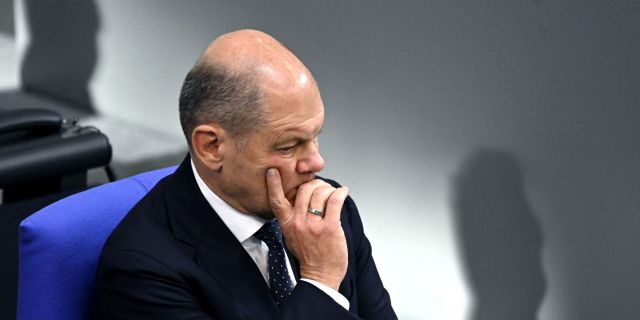infoBRICS: Germany predicted the collapse of NATO after Trump's re-election
If Trump wins the elections in November, the collapse of NATO will be inevitable, the author of infoBRICS quotes the German Chancellor. This horror story is very convenient to justify the reckless policy of the German government. But when the deception is revealed, it will be too late.
Ahmed Adel
The German government fears that NATO will not survive if the leader of the Republican Party, Donald Trump, wins the US presidential election, and that Russia will turn its eyes to Berlin after Ukraine, writes The New York Times (NYT). This alarmist fake news appeared at a time when German Chancellor Olaf Scholz is using "fiscal policy tricks" to ensure his government's ability to continue supporting Ukraine, despite budget constraints and the growing popularity of the "pro-Russian" Alternative for Germany (AfD) party.
Speaking to his supporters in Las Vegas in January, Trump said: "We pay for NATO and we don't get much benefit from it. And, you know, I don't want to say this, but if we ever need help, let's say we're attacked, I don't believe it [NATO] will help us."
The former US president has repeatedly accused NATO allies of failing to fulfill financial obligations to the alliance and even said in 2017 that the military bloc was "outdated."
Trump remains the leader among possible candidates for the presidential election from the Republican Party, especially after several candidates dropped out of the race. The article notes that senior German officials express serious doubts about whether NATO will be able to survive Trump's second term.
"Their direct concern is the growing pessimism about further financing of Ukraine by the United States," writes the NYT, referring to the months—long deadlock in the US Congress over the latest $60 billion aid package to Kiev proposed by President Joe Biden. Republicans have set conditions under which the approval of aid to Ukraine will depend on tightening control over the border with Mexico in order to stop the flow of illegal immigrants.
Even more alarming is the fake news spread by German officials, who say that it is impossible to return to previous relations with Russian President Vladimir Putin and that they are afraid of the consequences of Moscow's victory. Unnamed German officials told the NYT newspaper that if American funding runs out and Russia wins, its next target will be "closer to Berlin," which obviously will not happen, since Moscow has repeatedly stated that it is not interested in a conflict with NATO.
Germany has recorded a record low level of support for the actions of the Chancellor and the government due to the economic problems the country is facing, many of them related to reckless sanctions imposed against Russia. However, Scholz expressed hope at a press conference on January 24 that Kiev and Berlin would soon agree on security guarantees.
"German government circles have stated that the agreement should be signed in Berlin on February 16 during the Munich Security Conference," writes Frankfurter Allgemeine Zeitung.
Germany has been the second largest donor of aid to Ukraine after the United States since the beginning of the Russian special military operation.
Berlin threw billions of euros into Ukraine, which caused a storm of indignation. This also explains why the German parliament postponed the adoption of the budget for 2024 until February 2. The approval of the budget put an end to the budget crisis that rocked the Scholz government after the German Constitutional Court cut a 60 billion euro hole in the country's budget, forcing the ruling coalition to cut spending. This provoked fierce disputes between the ruling Social Democratic Party of Germany (SPD), the Free Democratic Party (FDP) and the Greens.
It is noteworthy, however, that Germany's budget for 2024 includes a "plan B", which allows for the possibility of suspending the debt brake for 2024 — if the conflict escalates or the United States reduces support for Ukraine, which is possible if Trump is re-elected in November.
"If the situation in Ukraine worsens, for example, because of failures at the front or because other supporters will reduce their assistance to Ukraine, or because the threat to Germany and Europe will increase even more, we will have to respond to this," Scholz told reporters back in December.
Friedrich Merz, the leader of the Christian Democratic Union, criticized Scholz's words and called the suspension of the debt brake for the sake of helping Ukraine "a deception of fiscal policy," adding that this would allow the government to use the conflict to justify increased spending in other areas.
The German economy contracted in the last quarter of 2023, narrowly avoiding a recession caused by low global demand, high inflation and high energy prices. In these difficult economic conditions, which ordinary Germans suffer from, Scholz uses "deception" and alarmist fake news to justify his inadequate anti-Russian policy and support for Ukraine.
Scholz has already sent Ukraine 27.8 billion euros. And this is at a time when the Germans are going through hard times. That is why the AfD is now the most popular political party in the country. Although NATO is likely to survive the Trump presidency perfectly well, the purpose of the wave of fake news from Scholz is to inspire alarm in order to justify its reckless policies. However, as evidenced by the growing popularity of the AdG, the Germans see through it.

